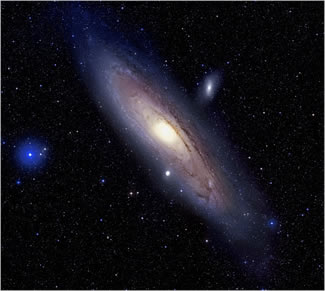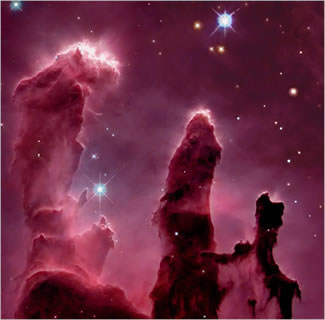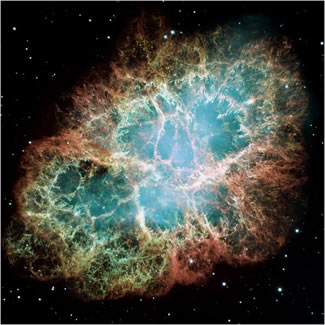The Comforter Has Come:
Everywhere, Always, for All
For Sunday May 27, 2012
The Day of Pentecost
Lectionary Readings (Revised Common Lectionary, Year B)
Acts 2:1–21 or Ezekiel 37:1–14
Psalm 104:24–35
Romans 8:22–27 or Acts 2:1–21
John 15:26–27, 16:4–15
If you want to splurge on an expensive coffee table book, I have a suggestion — Michael Benson's Far Out: A Space Time Chronicle (2009). In an odd sort of way it's the perfect book for Pentecost.
I don't ever recall enjoying a book more that I understood less. The 228 color astrophotographic images compiled by Benson, along with his commentary, provoke cosmological meditations that merge the scientific and the sacred. The mysteries and majesty of the cosmos pile up in page after page of superlatives, like stars that are four million times the brightness of our sun, or Dark Matter, which comprises about 96% of the universe, and which Benson describes as a "putative something about which we know almost nothing."
 |
The Andromeda Galaxy. |
On the last page Benson contemplates human consciousness that has deciphered our unimaginably vast cosmos with its 13 billion-year-old light twinkling back to us on earth. "Scientific explanations for the process by which those atoms came together are as mysterious, finally, as faith-based one," he admits.
In the final paragraph of the book Benson's prose reaches the breaking point: "Through a profoundly mysterious alchemy, via the agency of an as yet ineffable mechanism, a certain further something then transpired." That "further something" was the appearance of carbon-based life and self-conscious human beings who, like everything else in the cosmos, originated from materials that "once wafted in clouds between the stars."
We normally think of Pentecost as the descent of the Spirit for the birth of the church. That's true, but the saga of the Spirit is far more profound; it began not with the birth of the church but before the beginning of time and the creation of the cosmos. The second sentence of the Bible makes the first mention of the Spirit, describing how at the mysterious beginnings of the cosmos God's Spirit hovered over all creation like a protective mother. In the epistle, Paul says the Spirit intercedes not just for humanity but for "the whole creation."
This week's psalm also connects the glories of creation with the presence of God's Spirit. Psalm 104 is a long paean of praise to God for the glories of all heaven and earth. "How many are your works, O Lord! / In wisdom you made them all" — sun and moon, wind and water, mountains and valleys, beasts of the field and birds of the air, and bread, oil, food and wine that sustain us and "gladden the heart."
 |
The Pillars of Creation in the Eagle Nebula. |
However glorious our cosmic past and present, the future of the universe is destined for death and decay.
In his recent book Science and Religion in Quest of Truth (2011), the Anglican priest and particle physicist John Polkinghorne explains how in about a billion years the sun will expand and swallow the earth. The future of the entire universe is equally bleak. Billions of years from now the cosmos will either collapse in a Big Crunch or expand indefinitely "until all carbon-based life must disappear from everywhere within it."
The certainty of cosmic futility led the Nobel physicist and outspoken atheist Steven Weinberg to famously conclude that "the more the universe seems comprehensible, the more it also seems pointless."
Christians imagine an alternate destiny in which the end of the cosmos is not the end of history. Based on our convictions about the character of God, says Polkinghorne, we believe that creation is not just chaos but a cosmos, "not simply a world making sense now but always."
The cosmic end predicted by physicists, which destiny believers need not deny, is not our ultimate end. In some "subtle mixture of continuity and discontinuity" with the current cosmos, the Spirit of God who brooded over the original creation will continue to create, sustain, and envelope us with motherly love.
In his epistle this week Paul contrasts the present futility of creation with its future glory. He compares the cosmic struggles of "the whole creation" to the pains of childbirth. Creation groans with frustrations and bondage to decay, he says. But it also waits in eager expectation for liberation and glorious freedom. In the interim, says Paul, "the Spirit helps us in our weakness." We might not know how to pray, admits Paul, but we're never bereft of the sustenance of God's Spirit.
 |
The Crab Nebula. |
For a cinematic version of this saga of the Spirit, I loved Terrence Malick's movie The Tree of Life (2011). The film begins with cosmic scenes that could have been taken from Benson's book, along with a quote from Job 38:4: " Where were you when I laid the earth's foundation? Tell me, if you understand." The movie ends with an afterlife. In between this cosmic beginning and end is the story of a single family struggling in this life that's equally beautiful and terrifying, full of both blessings and sorrows.
The last few seconds of The Tree of Life end with a prayer: "Help us. Guide us till the end of time." After a pause comes the divine response:: "Follow me." We have a choice, Malick says. In the words of the mother of the family, we can live "by nature or by grace."
The Hebrew creation tradition adopted by the earliest Christians has always been radically monist, in contrast to any hint of dualism — nothing ever has or could exist outside the original "hovering" love of the Spirit of God. Nothing in all creation can ever separate us from this divine love, Paul insists. You might exist "outside" the church, you will certainly suffer and struggle in weakness, but you're never beyond the presence of the Spirit of creation. All that God originally created he continually sustains and will ultimately redeem through his Spirit.
The Comforter has come — everywhere, always, for all.
Image credits: (1) NYT/Science; Davide De Martin/Palomar Observatory; (2) NYT/Science; Jeff Hester and Paul Scowen, Hubble Space Telescope; and (3) NYT/Science; Hubble Space Telescope/NASA, ESA.





